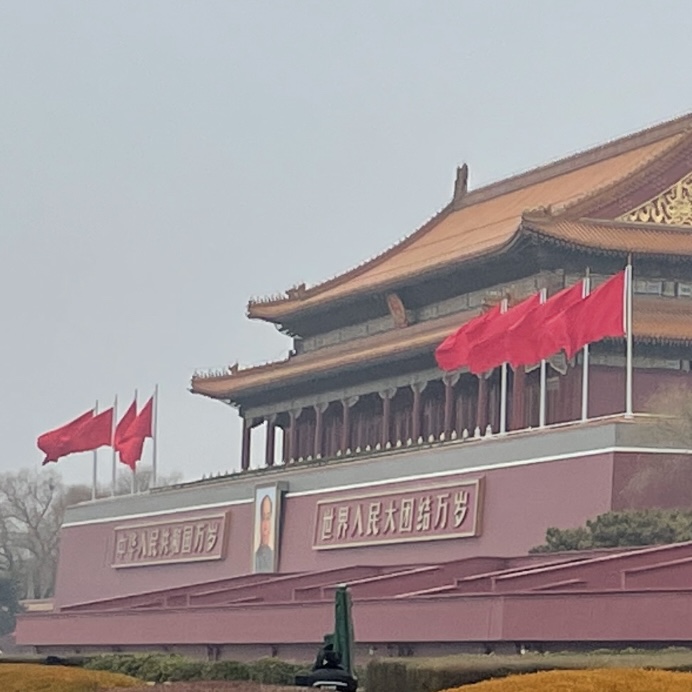- 10 Posts
- 40 Comments

 3·7 months ago
3·7 months agoOrientalism definitely plays a role

 0·8 months ago
0·8 months agoAgreed, no system, group, or party is infallible. There are many genuine critiques that can and should be made.

 9·8 months ago
9·8 months agoArchived link/paywall bypass: https://archive.is/VbSPI
Also, you would think a region once plagued by unrest and terrorism (fomented by our favorite imperialist power of course), now stable and prospering would be cause for celebration? No? Also about NEV subsidies, isn’t this what all countries should be doing? Besides, the Global North has long subsidized industries when they chose to.

 30·8 months ago
30·8 months agoRelated, China has become the number one scientific destination with the largest inflow of researchers outstripping the US, according to OECD data as reported (archive) by Science Business. I can’t cite the OECD data since it seems to be behind a paywall, but I believe you can find it here.
China also leads the world with nearly half of all applications for international patents (46.8%), trademarks (48.3%), and industrial designs (53.8%).
Japan’s science and technology ministry also conducted a study, as reported (archive) by Nikkei Asia, and found China leads the world in research papers. Both in quantity and quality.
A report by Clarivate substantiates this. This report also describes how China is not reliant with collaboration with the Global North for research, and that China is expanding research with Global South countries.
Despite all this, in the imperial core they still believe China can’t innovate. All while China is out-innovating the Global North.

 2·8 months ago
2·8 months agoI can confirm Lemmygrad is accessible. Hexbear is, but loads VERY slowly in my experience. No such issue for Lemmygrad.
By the way, the firewall varies slightly in different provinces. That being said Lemmygrad seems accessible everywhere.
ps: most sites are accessible. Only big American tech sites that don’t want to follow local law (Google, Facebook, etc.) are blocked. Many other websites are not blocked but just load really slowly. Not certain why, part of it may be the websites throttling IP address from China.
What is the general area/field your diploma is in? I dont think thr Chinese government will let arbitrary people into China to set up a commune… However, you could consider continuing your education in China (presumably a master if you have a bachelor?). China has scholarship schemes that you can look into. Many have full tuition plus living stipend. Then, you will improve your skills and enable yourself to stay more easily subsequent to your studies, if you so chose.

 2·1 year ago
2·1 year agoWell, to be fair I didn’t add the link to the article by accident, so it is a bit confusing…
https://www.salon.com/2017/10/08/womens-labor-sex-work-and-u-s-military-bases-abroad/

 5·1 year ago
5·1 year agoSorry, I forgot to add the link to the article hahaha
https://www.salon.com/2017/10/08/womens-labor-sex-work-and-u-s-military-bases-abroad/
Economic growth itself is just a number, development is what matters. In addition and as a part of development I also specifically mentioned education and improvement of quality of life. You could add literacy, housing, levels of nourishment, and much, much more.
I won’t argue about history or its interpretations with you now. Just consider the path to development wealthy capitalist countries took, which involved slavery, colonialism, genocide, brutal worker suppression, and perhaps the worse working conditions in history during industrialisation.
You may attribute many horible things to communist countries. I might argue much of this is exaggerated by the media of the anti-comunist country you live in. Even if it is all true, developed capitalist countries did the same to themselves, and other peoples around the globe.
Then consider the development communist countries have had compared to undeveloped capitalist countries. People can have better lives, that is what matters.
Individuals in struggling societies don’t always atomize, many revolutions occurred due to degradation in conditions. When the cost of fighting for change is less than doing nothing you will fight, and you will fight with others, or else you will quickly fail and be forgotten.
Curious what your definition of facism is. With a few exceptions, communist inclined states have always lead to unprecedented economic development, education, improvement of quality of life, etc. If you take all cold war propaganda at face value, you can not deny the development seen in such states; when balanced by alleged atrocities, you see a stark contrast to colnialist nations that too committed atrocities but with little to show for it.
I find the surface level historical criticisms of communist states, even if applied at an equaly superficial level, is applied to capitalist states, you would find a staggering contradiction. Maybe you should read more. Add to your socioeconomic calculus the fact that no communist state benefited from the same starting point as colonizer countries, and try to be critical of this. Consider that none of these communist states had the benifits of colonization, and when compared to other developing countries did remarkably better.
The point is not about impact but intention. Evidently liberalism, for all its flaws, certainly has had a significant impact. The progressive forces 250 years ago where for the most part already proto socialists. Fundamentally liberalism has been reactionary, even in the case of feudalism and monarchy, liberalism has tended to air for maintaining monarchy; such as constitutional monarchies where one can find leberals having preference for this rather than republics. This can be observed in historical cases such as France where many liberals wished to maintain the monarchy, but the contradictions and progressive forces where too great. Rather than a progressive force, I would contend that liberalism tends to be reactionary to development and progressive forces. Today this can be seen in the liberal leaders of developing countries handicapping themselves and their sovereignty by maintaining economic relations to the benefit of the imperial core. See ECOWAS and ‘preserving democracy’ as of late.
Curious if you could elaborate. Authority is complicated. Perhaps you should read this relatively short text by Engels.
The point is that liberalism and facism are intrinsically linked. Liberalism does not seek to change the world and stems from philosophies instead seeking to explain it. Accordingly, liberalism is a philosophical justification for the capitalist status quo. As such, when contradictions in capitalism accentuate with time, such as those between classes, liberalism turns to fascism. Scratch a liberal and a fascist bleeds, because the liberal is a closet fascist when times are good; when class struggle poses a threat, it clamps down. You can see this throughout history.
That a poor, simplified explanation, but I hope it helps.
I can appreciate analog and/or specialized tools. I think typewriters, film cameras, watches, etc. are all fascinating. I might enjoy engaging with them. However, a low end Android is cheaper more accessible to most, assuming limited finances and/or no inheritance of such items. ‘Everything machines’ can be a boon for those individuals by means of concentrating utility and reducing cost. Evidently, capitalism nonetheless creates issues with this, as others have correctly discussed.
I would say that in China, one uses smartphones for neerly everything, even more so than in the global north. This is for various reasons, but it does have practically since all you ever need will be in your phone, including wallet and keys. This does make the development of HarmonyOS by Huawei very interesting. It may abate some of the current issues, especially given that I believe the OS is open source.

 1·1 year ago
1·1 year agoThat would help the economic situation in the imperial core… At least for the bourgeoisie.
Small aside, China has an extensive regular speed train network. Trains are still rather fast, but obviously slower than HSR. It is very beneficial to have both, as the slower trains are quite a bit cheaper. China has a large population, and many people take the regular train, even with standing tickets. These trains move a lot of people and are an important part of the transit system. Sometimes it feels like an inter-city metro since you can take trains at any time to any city.
As others have said, France became a liberal dictatorship of the bourgeoisie, while the Bolsheviks created a workers state.
Keep in mind, if you look into french history, the more radical elements are denounced. For instance, decrying purges done by the Jacobins, while the monarchy slaughtered many more. French schools actually condem many aspects of the revolution, even though the system is content with the end result.
Another point: guillotines where actually conceived as a humaine alternative to hangings. You don’t feel much when decapitated in a fraction of a second, even if the end result is macabre. On the other hand, if you are shot, hopefully a bullet finds its way somewhere that will end you quickly. Either way, good riddance to the monarchs; both dynasties oppersed their people and perpetuated systemic harm.

 3·1 year ago
3·1 year agoIt is probably true that Egyptian government does not care very much for the Palestinian’s interests. That being said, if there is a shift on their part to promote a united front in Palestine, this should be favorable to the Palestinian people; even if not done so for their sake but as a part of geopolitical shifts. Such can be seen in the regional shift away from the USA, as can be seen in the case of Saudi Arabia.





Not just infrastructure, payments are also convenient with Ali pay/WeChat pay. Everyone pays everything by phone, most haven’t used cash or card in years, although you can if you want. Apps are also ridiculously well designed and integrated, less visible as a foreigner, as much if it is obviously in Chinese and you have a language barrier. But you can really do anything you can imagine in WeChat. Alipay can also translate in miniapps. Say you are in a restaurant, you will scan a qr code on the table, can have a menu that you can automatically translate if you so chose. You also can order and pay through that menu on your phone.
Bureaucracy exists like everywhere else, but tends to be faster and more efficient in my experience. It’s not perfect, but the country does feel very different.
Also, it doesn’t depend that much on the city. I have been to most large cities in China, many small and medium sized ones too. I have also been to the countryside. The latter is more relaxed, but everywhere has technology and infrastructure. Basically all cities are serviced by train. Towns will all have bus systems that mean you can get anywhere in the country with public transportation.